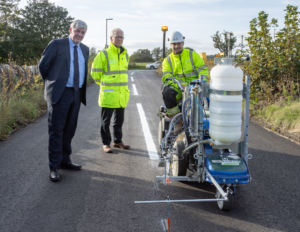More than 30 potholes in Fife are being fixed every day – with two thirds of them on roads in the north of the area, according to new data published by the council’s roads department.
It shows that the council’s 12 repair teams dispatched across the region have repaired 7,652 potholes since September last year.
Every repair marked ‘critical’ – meaning it should be addressed within 24 hours – was fixed on time, as was every single low priority fix within a 12-month target, said the council.
Around 96% of high priority reports were fixed within the expected five-day deadline, while 92% of medium priority potholes were sorted within three months.
While surveys suggest the overall condition of Fife s roads has improved since 2010, high priority repairs account for around two thirds of all pothole fixes in Fife – suggesting that problems are substantial when they do arise, acccording to a report by Fife Today.
In addition, around two thirds of all repairs carried out occur in the north of the Kingdom, covering the north-east, Levenmouth and Glenrothes.
Derek Crowe, Fife Council’s roads manager, says the authority’s usual two to four repair squads have been upgraded to as many as a dozen to address the adverse road conditions brought about by a particularly cold and wet winter
“We’ve brought colleagues in from construction, and two external contractors, which we’ve never had to do before,” he said. “The aim over the next three months is to go through the backlog, and get that behind us.”
The council has introduced a new way of assessing potholes and better ways of fixing them. Instead of quick-fix patch jobs – which might keep the holes filled for a short period of time – repairs are now much more thorough and are designed to be a “one-off” that should not need addressing again in the short-term.
While this strategy is better in the long-term, it does mean that some repairs assessed as low priority will not be carried out for up to a year.
“We’re intervening to carry out complete, permanent repairs with material compacted by proper rolling plant,” he added. “Quick and dirty repairs are not good enough and that’s not what we’re trying to do.”
























